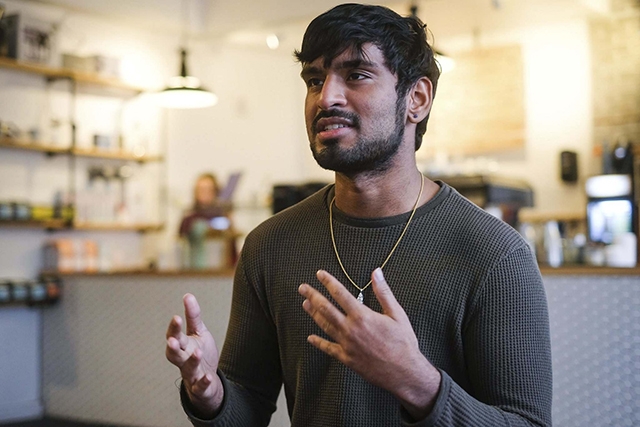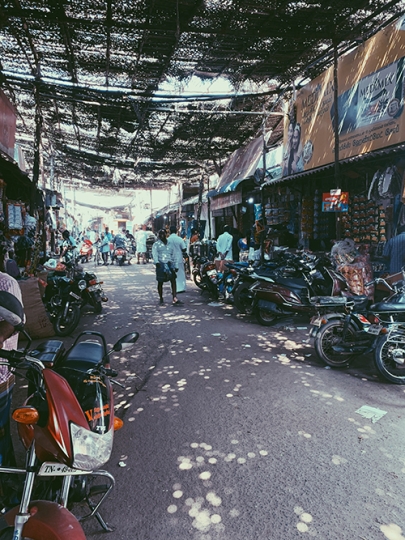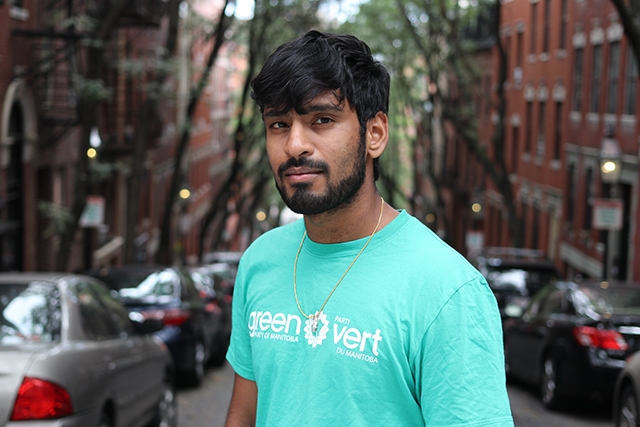Rhodes Scholar Sai Rajagopal, a joint concentrator in studies of women, gender, and sexuality, and biomedical engineering, wants to improve trans health care. (Photo provided by Sai Rajagopal)
For 2020 Canadian Rhodes Scholar Sai Rajagopal, everything came together when he went to India.
Rajagopal, a joint concentrator in studies of women, gender, and sexuality, and biomedical engineering at the Harvard John A. Paulson School of Engineering and Applied Sciences, spent a gap year conducting research in Chennai and Jaipur, enhancing a low-cost prosthetic leg to make it more comfortable for patients. He also translated for YRGCARE, a nonprofit that serves the nation’s HIV/AIDS community.
“What really opened my eyes were my experiences talking to LGBTQ+ individuals, learning where their health care was failing them and why they aren’t he able to get access to treatment. A lot of it is stigma, but another large part is [the lack of] medical innovation within marginalized spaces,” he said. “That is what brought me into the space of gender affirming health care.”
It’s not a space Rajagopal even knew existed during his youth in Winnipeg. He had always enjoyed building things—toy cars for scouts, wood shop projects with his dad, greenhouses and robots at high school, and arrived at Harvard planning to study mechanical engineering.
But an introductory course ignited his passion for biomedical engineering, which he saw as a way to help others by developing medical devices. And a general education course, Sexual Ethics as Ethical Reasoning (ETHRSON 42), introduced Rajagopal to the complex and nuanced issues of gender and sexuality throughout India.
That course inspired him to take a risk and spend a gap year in a completely unfamiliar culture, learning poignant lessons about humanity while building engineering skills.
During his gap year in India, Sai Rajagopal spent time wandering this bazaar in search of parts for engineering projects. (Photo provided by Sai Rajagopal)
For instance, since the nearest Home Depot was several thousand miles away, Rajagopal would wander through a massive bazaar in search of parts, bartering in Hindi for mechanical components. And then once he obtained the parts, with no fab labs or cocreation spaces nearby, he worked on prototypes with whatever tools he had on hand.
“What India really taught me is how to innovate in low-cost, low-resource situations,” he said. “When I run into a problem here, I have more tools to fix it, but it gives me an idea of how to fix a problem more efficiently and in a way that makes sense economically, as well.”
He is now applying those skills to a thesis project inspired by his year in India.
Working in the lab of Robert Langer, the David H. Koch Institute Professor at MIT, Rajagopal is developing a hydraulic pump implant for phalloplasty surgery, using improved materials and enhanced structural design to reduce failure rates. Many currently available phalloplasty implants have a five-year failure rate of over 50 percent, he said.
“I found that shocking. You would think, for a medical device, it would have a lifetime warranty,” he said. “What I’ve found is that for this group, transgender individuals who want a phalloplasty, often medical companies don’t seem to care too much. That inspired me to use my skills to innovate in this space.”
At Oxford University, Rajagopal plans to focus on gaining knowledge he can use to make a positive impact for transgender individuals around the world. He intends to study the history of trans medicine, especially in populations outside of the Western world and in pre-colonial times.
For instance, a form of castration surgery has been performed for millennia in India for trans women with a very high success rate and a very low rate of infection, he said. And even in Rajagopal’s native central Canada, a number of alternate genders exist, such as two-spirit populations that conceive of themselves very differently from the male/female binary.
Though Sai Rajagopal didn't win an election to the Canadian Parliament as a member of the Green Party in 2019, he plans to run again someday. (Photo provided by Sai Rajagopal)
“We see that many of these groups don’t access the health care system now, so I want to explore some of the historic links between how they were treated at colonial contact up the present to understand how they were excluded from the health care system today,” he said. “Ultimately, what I want to do is go back to Canada or work here in the U.S. in a nonprofit space and design policy that includes queer/trans people within the health care system.”
Rajagopal is no stranger to policy or politics. In 2019, he ran for the Canadian Parliament as a member of the Green Party.
Although he didn’t win, he learned a great deal from the experience and fully intends to run again, with a focus on driving change around environmental and health care policy in Canada.
“I never envisioned myself to be in this space,” he said. “I always thought I would be improving some mechanical efficiency, like in an automobile or a heart stent. However, these experiences that were so unexpected changed my trajectory quite a bit. I’m looking forward to the experiences I am going to have, and I realize that plans can change, and that is a good thing.”
Press Contact
Adam Zewe | 617-496-5878 | azewe@seas.harvard.edu


